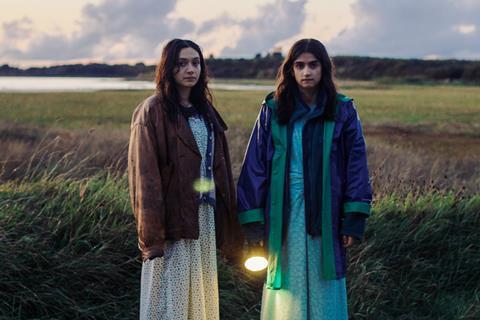
Ariane Labed’s feature directorial debut September Says won the Golden Hitchcock for best film at Dinard Festival Of British & Irish Film, which drew to a close in its French seaside setting yesterday (October 6).
The film follows two sisters on a holiday in Ireland, adapted from Daisy Johnson’s 2020 novel Sisters, and world premiered earlier this year in Cannes’ Un Certain Regard.
Best performance went to Irish actor Lalor Roddy, for his role in Pat Collins’ That They May Face The Rising Sun, which world premiered at last year’s BFI London Film Festival. A couple return from London to the small Irish community where one of them grew up.
Sally El Hosaini and James Krishna Floyd’s Unicorns won the jury’s special prize and the audience award. Screen Star of Tomorrow Jason Patel plays a Muslim person from Manchester who lives a double life in London as flamboyant drag queen Aysha.
Jethro Massey’s Venice Critics’ Week winner Paul And Paulette Take A Bath, about a duo’s macabre adventures in Paris, scooped the first feature prize.
This year, the 35th edition, was the first under the film’s new moniker, previously known as the Dinard Festival Of British Film. Irish films proved popular, with That They May Face The Rising Sun the first to sell out, plus two Irish documentaries, The Flats and The Irish Question, also going on to be sellouts, according to the festival,
Irish films have long been programmed in the line-up, within the Irish Eyes in Dinard strand, with the festival’s artistic director Dominique Green pointing towards the “deep cultural link between Brittany and Celtic culture” as reason for the popularity of Irish fare with the Dinard audiences.
As of Sunday morning, with a day to go before closing and fewer films in the line-up owing to longer running times, the festival was up from last year’s 65% of capacity to 73% capacity.
This year, the festival was funded with support from the British Council France (including the Great fund) British Council UK, Screen Ireland, Culture Ireland, Irish Film Institute, Tourism Ireland and the Ministry of Foreign Affairs, Ireland.
“Finding new French sponsorship in an Olympic year has been a challenge, but many of our regular local businesses and regional partnerships, like La Region Bretagne, have been faithful,” said Green.
However, funding remains a key challenge. “Like all festivals, indeed all businesses and households, increased costs without accompanying increase in budgets, has been an issue,” she noted.
“The cost of subtitling films without French distribution is a big financial challenge for us as well as all the issues surrounding the use of AI subtitles. It’s an ongoing discussion for us.”
The festival’s enhanced commitment to Irish film has helped open up new avenues of funding. “It is true that this opens some European funding potential – which we have to explore more fully,” confirmed Green. “And of course, institutional Irish support has been fantastic.”






















No comments yet